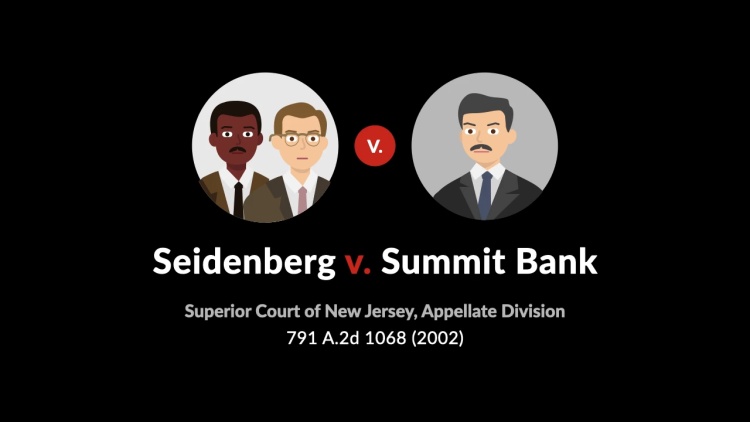Seidenberg v. Summit Bank
Superior Court of New Jersey, Appellate Division
791 A.2d 1068, 348 N.J. Super. 243 (2002)
- Written by Sarah Larkin, JD
Facts
Seidenberg and Raymond (plaintiffs) formed two successful brokerage firms that dealt with insurance benefit plans. The two had worked in the insurance business for several years. They sold their stock to Summit Bank (Summit) (defendant). All parties had the assistance of counsel in reaching the agreement. As part of the agreement to sell, Seidenberg and Raymond remained as executives and were placed in charge of daily operations. The agreement provided that, unless terminated by Summit, Seidenberg and Raymond could expect employment until retirement age. Two years after entering into the agreement, Summit fired Seidenberg and Raymond. Seidenberg and Raymond filed suit. They claimed that Summit ran the brokerage firms poorly, affecting their reasonable expectations of compensation and future involvement in the firms. Seidenberg and Raymond alleged that Summit performed under the contract in bad faith and that their termination was conducted in bad faith. They claim that they “suffered as a result of … Summit’s bad faith” and that Summit’s actions were “wanton and willful and without privilege or right.” Summit filed a motion to dismiss, alleging that Seidenberg and Raymond failed to raise a claim for which relief can be granted. The trial judge granted the motion. The trial judge held that Seidenberg and Raymond were not claiming a breach of the duty of good faith and fair dealing, but were seeking to enforce an oral agreement in violation of the parol evidence rule because it was not contained within the express agreement into which the parties entered. The trial judge also held that, because the parties to the agreement enjoyed equal bargaining power, Summit could not have breached its duty of good faith and fair dealing. Seidenberg and Raymond appealed to the Superior Court of New Jersey.
Rule of Law
Issue
Holding and Reasoning (Clarkson, J.)
What to do next…
Here's why 906,000 law students have relied on our case briefs:
- Written by law professors and practitioners, not other law students. 47,100 briefs, keyed to 995 casebooks. Top-notch customer support.
- The right amount of information, includes the facts, issues, rule of law, holding and reasoning, and any concurrences and dissents.
- Access in your classes, works on your mobile and tablet. Massive library of related video lessons and high quality multiple-choice questions.
- Easy to use, uniform format for every case brief. Written in plain English, not in legalese. Our briefs summarize and simplify; they don’t just repeat the court’s language.





